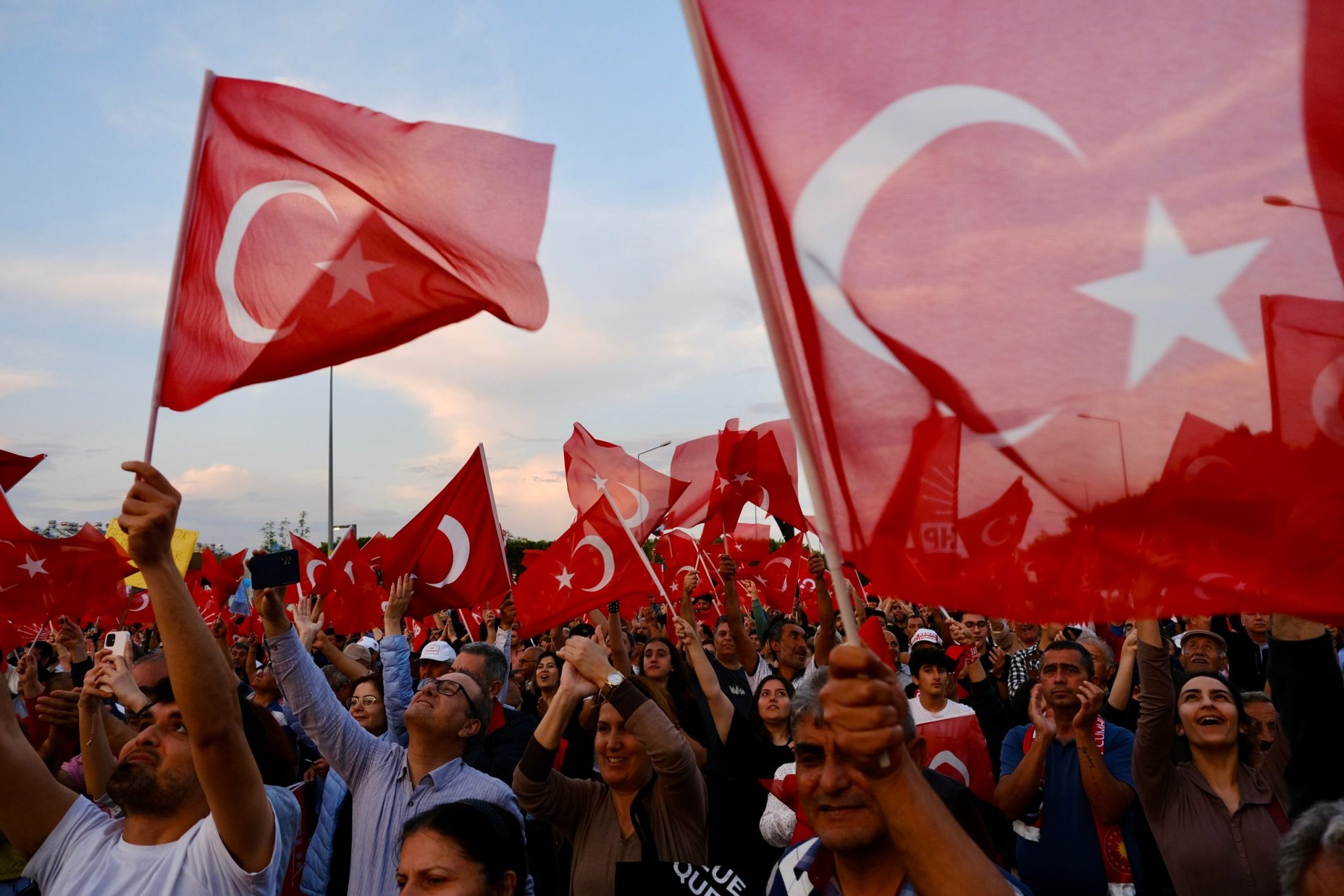Elections in Turkey had high turn-out, meaningful results, and little violence, but that doesn’t mean they were free from autocratic manipulation on the part of the regime.
On Sunday, Turkish voters went to the polls in a mostly free but highly unfair election. Voters were able to cast ballots without major instances of violence, and votes were tallied without substantiated allegations (at least so far) of systemic fraud or widespread ballot stuffing of a scale that would affect the outcome of the election. On Tuesday, rumors went viral on Twitter of widespread irregularities in the tabulation process, but many of these proved to be unfounded. The opposition Republican People’s Party (CHP) issued a statement explaining that they have filed appeals to the results for several thousand ballot boxes, and that some of these corrections have already been made, but that they do not believe that the irregularities affected the final result.
But the election was marred by other forms of interference on the part of the ruling regime, including government pressure on Twitter which led to the company suppressing certain accounts and posts in the days leading up to the election. The government is also accused of using its control over the state-run Anadolu Agency to compel or encourage the latter to sequence its reporting of results in an order favorable to the incumbent. Perhaps most importantly, the election was conducted in the context of widespread persecution of the opposition: several opposition leaders have been in prison for years, a prospective opposition candidate was convicted of insulting the Supreme Electoral Council and provisionally barred from politics, the opposition campaign was almost entirely ignored by the regime-controlled media, and on several occasions pro-government rioters and thugs attacked opposition party campaign events and personnel without condemnation by the regime. In these ways, the election campaign was decidedly not fair.
President Recep Tayyip Erdoğan faced major headwinds in the weeks leading up to the election due in large part to the terrible state of the Turkish economy—which many blame on Erdoğan’s unorthodox monetary policies. The government’s poor handling of rescue and recovery efforts in the wake of an earthquake, along with accusations that state corruption in the construction sector worsened the scale of the disaster, contributed to resentment as well. But Erdoğan used his control over the state media (through appointments and regulatory bodies) and private media (through the consolidation of ownership into the hands of a few pro-regime oligarchs) to refocus national attention away from the earthquake and economy and instead towards pro-government narratives about how Erdoğan had made Turkey great again. This helped him recover from a ten-point polling deficit in March and head into election day with polls showing a dead heat.
The political persecution of Erdoğan’s rivals is part of the context of the last decade in which this election must be understood. The former leader of the opposition People’s Democratic Party (HDP), Selahattin Demirtaş, has been in prison for over six years, and the HDP is under such intense legal scrutiny that its candidates ran on the Green Left Party’s list this year. Regime officials have accused the HDP and the main opposition CHP of being aligned with the banned Kurdish Workers’ Party (PKK); Erdoğan himself played a deepfake video at a campaign event a week before the election that implied the PKK wanted the opposition to win. When Islamist or nationalist groups have engaged in violence against the opposition, as happened the week before the election, regime officials have been silent or blamed the victims for inciting the violence against them.
Given this backdrop, many feared that widespread violence and intimidation would mar the voting process, but thankfully this did not occur. Nevertheless, the regime put its finger on the scale by demanding that Twitter limit access to certain content in Turkey (by threatening to block the site completely if Twitter did not comply with censorship requests), and allegedly by manipulating the ballot counting effort to ensure that favorable results came in before unfavorable ones. This appears to have been accomplished through pressure on the state-run Anadolu Agency, and by Justice and Development Party (AKP) election officials using spurious recount demands in districts that had voted against the party to ensure that those results were reported as late as possible.
All these factors contributed to a better-than-expected evening for Erdoğan and the AKP, though neither candidate achieved the 50% necessary to avoid a recount. Thus, Turkish voters will head back to the polls in two weeks to make a final decision between Erdoğan and opposition candidate Kemal Kılıçdaroğlu. We should expect the regime to pull out all the stops to ensure that this contest is as or more unfair than this past weekend’s poll. This is likely to include further efforts to manipulate narratives in traditional media while suppressing content online that the regime finds disadvantageous, but it could also involve more egregious anti-democratic steps, including encouraging violence by regime supporters or manipulating the vote totals directly. But these efforts should also serve as a reminder that voting in Turkey still matters, and that efforts to rig an election in their favor remain much more achievable for the regime than attempts to steal it outright.
The views expressed in GMF publications and commentary are the views of the author alone.





